1 Year PG Diploma Approved by University
First PGDM in digital marketing Program in India to Offer Advance Practical Digital Marketing Expertise & University Approved Diploma with 100% Guaranteed Placement
About PGDDM in Digital Marketing
The Post Graduate Program in Digital Marketing Strategy and Planning is designed industry experts for Fresher graduates, Working professionals and entrepreneurs who seek to accelerate their career in the booming field of Digital Marketing. Students will be get hands-on exposure through agency based live projects and case studies. One dedicated mentor will be assigned to every student throughout the sessions and help you in achieving your success goals.
Anyone with any educational background can learn it. Digital marketing is ranked as one of the most demanding & highest paid skills in the World. Now all Big & Small companies need expert Digital marketers to take their Business online.
This single Course has the power to give you 15+ career options. In this program, you will learn Graphic designing, Web designing, Social media management and advertising, Digital marketing strategy, how to start a business online, Earn money online, and many more…

Awarded as "Best Digital Marketing Institute in Punjab"

Only Institute in Punjab Offering PG Diploma in DM

Pay Fee in Easy 6-9 Monthly Installments

Offline & Online Live Classes available
Course Highlights
- 10+ Certifications
- Complete Practical
- Small Batches
- Online & Offline Classes
- Live Campaigns
- Work on Live Projects
- Practical Assignments
- 100% Placement Support
Course Syllabus
Please click on the given subjects to see the full detail of that curriculum
SEMESTER-1
Digital Marketing Fundamentals
Course Objectives: This course will acquaint the learners to create a structured digital
marketing plan and budget, Identify the correct measures to set objectives, and evaluate digital
marketing, Review and prioritize the strategic options for boosting customer acquisition,
conversion, and retention using digital marketing.
Course Outcomes:
- Develop a digital marketing plan that will address common marketing challenges.
- Articulate the value of integrated marketing campaigns across SEO, Paid Search, Social,
- Mobile, Email, Display Media, Marketing Analytics.
- Recognize Key Performance Indicators tied to any digital marketing program.
- Improve Return on Investment for any digital marketing program.
Unit-I
- Introduction & origin of Digital Marketing
- Traditional v/s Digital Marketing
- Digital Marketing Strategy
- The P-O-E-M Framework
- Segmenting & Customizing Messages
- The Digital landscape
- Digital Advertising Market in India
- Skills required in Digital Marketing
- Digital Marketing Plan
Unit-II
- Social Media Marketing: Meaning, Purpose, types of social media websites
- Blogging: Types of blogs, Blogging platforms & recommendations
- Social Media Engagement
- Target audience
- Sharing content on social media
- Do’s and don’ts of social media
- Search Engine Optimization: Meaning, Common SEO techniques, Understanding Search Engines, basics of
- Keyword search, Google rankings, Link Building, Steps to optimize the website
- Basics of Email Marketing: Types of Emails, Mailing List, Email Marketing tools, Email Deliverability &
- Email Marketing automation
Unit-III
- Facebook Marketing-Introduction, Facebook for business. Anatomy of an Ad Campaign, Role
of Adverts-Types & Targeting, Adverts Budget & Scheduling, Adverts Objective & Delivery - LinkedIn Marketing-introduction & importance, LinkedIn Strategies, Sales Leads Generation
Using LinkedIn, Content Strategies - Mobile Marketing-Introduction, Mobile Usage, Mobile
Advertising, Mobile Marketing tool Kit, Mobile Marketing Features
Unit-IV
- Understanding Web Analytics: Purpose, History, Goals & objectives, Web Analytic tools &
Methods - Web Analytics Mistakes and Pitfalls
- Basics of Content Marketing: Introduction, Content marketing statistics, Types of Content, Types of Blog posts, Content Creation, Content optimization, Content Management & Distribution, Content Marketing Strategy, Content creation tools and apps, Challenges of Content Marketing.
Website Planning Process
Course Objective:
The syllabus provides the instructor and students with a contract, a common reference point that
sets the stage for learning the details required for making the website. The students should be able
to plan and design a website after completion of the course.
Course Outcome:
- Discover how does web works really, what makes websites work.
- Employ fundamental computer theory to basic programming techniques.
- Create an Information Architecture document for a web site.
- Know-how and where to start research, planning for a website
- Use fundamental skills to maintain web server services required to host a website.
UNIT I
- Internet: Meaning and Concept
- Understanding domain names & domain extensions
- Different types of websites, Based on functionality
- Based on purpose Planning & Conceptualizing
- Website Booking and a domain name & web hosting
- Buying a Domain
- Website Language & Technology
- Core Objective of Website and Flow
- One Page Website
UNIT II
- Adding domain name to web Server
- Adding web pages & content
- Adding Plugins
- Building a website using CMS in Class
- Identifying the objectives of the website
- deciding on the number of pages
required - Strategic Design of Home Page
- Strategic Design of Products & Services and Page
Strategic Design of Pricing Page
UNIT III
- Deciding on the number of pages required
- planning for engagement options
- Landing Pages &
Optimization - Creating a blueprint of every web page Best & Worst Examples
- Introduction to HTML : What is HTML, HTML Documents, Basic structure of an HTML
the document, Creating an HTML document, Mark up Tags, Heading-Paragraphs, Line Breaks,
HTML Tags, Working with Hyperlinks, Images and Multimedia; Working with Forms and
controls.
UNIT-IV
- Portfolio
- Gallery and Contact Us Page
- Call to Action (Real Engagement Happens)
- Designing Other Pages
- SEO overview
- Google Analytics Tracking Code
- Website Auditing
- Designing a Word press Website.
IT for Business & MIS
Course Objective: This course aims at providing fundamental knowledge and exposure to the
concepts, theories, and practices in the field of Information Technology and MIS. The course
will explain the relationship among and between information systems and management, analyze
how technology can be used to synthesize complex data to make sound business decisions.
Course Outcomes: After completion of the course, the students shall be able to:
- Have a basic understanding of how Information technology is used in organizations for
meeting strategic and operational goals. - Acquire skills using Information technology in the competitive business scenario through
data transformation, collaboration, and problem-solving. - Understand the software and hardware components of MIS, information structure, and
networks. - Understand why it is important to implement security measures for business Information
Systems and current trends.
Unit-I
Information systems and strategic implications:
- Data information systems
- Difference between data and information
- Information system activities and resources
- System approaches
Organizational sub:
- systems Support system
- Systems application in strategy building
Information Technology:
- Concepts of data
- information and computer-based information system
- Impact of information technology on business (business data processing intra-organizational and inter-organizational communication by using network technology business process and knowledge process outsourcing)
Unit-II
Information Technology and Business
An Overview:
Types of Information System –
- Transaction Processing System (TPS)
- Management Information System (MIS)
- Decision Support System (DSS)
- Knowledge Management System (KMS) – and their implementation at managerial levels (operational, tactical, and strategic)
- Recent trends in information technology
(brief ideas) – - Enterprise computing
- mobile communication
- smart card
Decision Support System:
- DSS and ES Software for Decision Support
- Group Decision
making - Enterprise-Wide computing
- Object-oriented analysis and design
Unit-III
Understanding MIS:
- Introduction to Management Information Systems
- History of MIS
- Impact of MIS
- Role and Importance
- MIS Categories
- Managers and Activities in IS
- Types of Computers Used by Organizations in Setting up MIS
- Hardware support for MIS
Kinds of Information Systems:
- Introduction
- Types of Management Systems
- Concepts of Management Organization
Planning and Control:
- Introduction
- Differences between planning
and control information - Systems Analysis
- Systems Design
MIS Planning and Development:
- Introduction
- Planning
- development
Unit IV
Strategic Management Information System:
- Introduction
- Background
- Performance
- Product differentiation and Value Chain
- How IT influences Organizations’ goals
- the five levels
- Governance Modes in the use of IT
Security and Ethical Issues:
- Introduction
- Control Issues in Management Information Systems
- Security Hazards
- Ethical Issues
- Technical solutions for Privacy Protection
Trends in MIS:
- Introduction
- Decision Support Systems (DSS)
- Artificial Intelligence (AI)
Modern Business Organization & Management
The objective of the Course: This course presents thorough and systematic coverage of Business
organization & management theory and practice. The course aims at providing fundamental
knowledge and exposure to the concepts, theories, and practices in the field of business
management. It focuses on the Business Framework, functions & process of management, with
special attention to managerial responsibility for effective and efficient achievement of goals.
Unit -I
Foundation of Indian Business:
- The spectrum of Business Activities
- Manufacturing and service
sectors - India’s experience of liberalization and globalization
- Technological innovations and
skill development - ‘Make in India’ Movement
- Social Multinational Corporations and Indian transnational companies
- Social responsibility
and ethics
Emerging opportunities in business
- Franchising
- Outsourcing and E-commerce.
Unit- II
Business Enterprises:
- Sole Proprietorship
- One Person Company
- Joint Hindu Family Firm
- Partnership firm
- Joint Stock Company
- Cooperative society
- Limited Liability Partnership
- Choice of Form of Organization
Entrepreneurial Process-
- Idea generation
- Feasibility study
- Basic considerations in setting up a Business Enterprise
Unit- III
The Process of Management:
- Planning
- Decision-making
- Strategy Formulation
Organizing: Basic Considerations
Departmentation –
- Functional
- Project
- Matrix and Network
- Delegation and Decentralization of Authority
- Dynamics of group behavior
- Conceptual framework of Marketing Management
- Financial Management, and Human Resource Management
Unit- IV
Leadership:
- Concept and Styles
- Trait and Situational Theory of Leadership
Motivation:
- Concept and Importance
- Maslow Need Hierarchy Theory
- Herzberg Two Factors Theory
- McGregor and Ouchi theory
Control:
- Concept and Process
Communication:
- Process and Barriers
- Transactional Analysis (TA)
- Johari Window
Change Management:
- Resistance to change and strategies to manage change conflict levels
- causes and resolution
- Functional and Dysfunctional aspects of conflict
- Emerging issues in management
Cyber Security Law
Course Objective: Cyber security law promotes the confidentiality, integrity, and availability
of public and private information, systems, and networks, through the use of forwardlooking regulations and incentives, with the goal of protecting individual rights and privacy,
economic interests, and national security.
Course Outcomes:
- Understand the key security requirements of Confidentiality, Integrity & Availability.
- Demonstrate the concept of Intrusion Detection & Intrusion Prevention
- Describe the concept of Security policies and Cyber Laws
- To spread awareness of Cyber Security is the need of the hour and particularly among the
law fraternity as these are the persons who have to handle the cases of cyber-crime.
UNIT-I
Computer Basics and Need of Cyber Law
- Introduction to Information System
- classification and components of information system
- Computer Security Concepts
- CIA (Confidentiality, integrity and availability)
- Security Functional Requirements
User Authentication:
- Means of Authentication
- Password-Based Authentication
- Token-Based Authentication
- Biometric Authentication
- Remote User Authentication
- Security Issues for User Authentication
UNIT-II
Intrusion Detection:
- Intruders
- Intrusion Detection
- Host-Based Intrusion Detection
- Distributed Host-Based Intrusion Detection
- Network-Based Intrusion Detection
- Honeypots
Firewalls & Intrusion Prevention Systems:
- The Need for Firewalls
- Firewall Characteristics
- Types of Firewalls
- Firewall Basing
- Intrusion Prevention Systems
Cryptographic Algorithms:
- Symmetric Encryption Principles
- Data Encryption Standards (DES)
Introduction to Internet
Security Protocols & Standards:
- SSL, TLS, HTTPS, IPv4 and IPv6 Security protocols.
UNIT-III
Cyber Law – International Perspectives :
- UN & International Telecommunication Union
(ITU) Initiatives - Council of Europe – Budapest Convention on Cybercrime
- Asia-Pacific
Economic Cooperation (APEC) - Organization for Economic Co-operation and Development
(OECD) - World Bank
- Commonwealth of Nations
Constitutional & Human Rights Issues in Cyberspace:
- Freedom of Speech and Expression in Cyberspace
- Right to Access Cyberspace –
Access to Internet - Right to Privacy
- Right to Data Protection
UNIT-IV
Cyber Crimes & Legal Framework :
- Cyber Crimes against Individuals
- Institution and State
- Hacking
- Digital Forgery
- Cyber Stalking/Harassment
- Cyber Pornography
- Identity Theft &
Fraud - Cyber terrorism
- Cyber Defamation
- Different offences under IT Act, 2000
CyberTorts:
- Cyber Defamation
- Different Types of Civil Wrongs under the IT Act, 2000
Intellectual Property Issues in Cyber Space :
- Interface with Copyright Law
- Interface with Patent Law
- Trademarks & Domain Names Related issues
Dispute Resolution in Cyberspace:
- Concept of Jurisdiction
- Indian Context of Jurisdiction and IT Act, 2000
- International Law and Jurisdictional Issues in Cyberspace
- Dispute Resolutions
Communication Skills
Objective: This subject aims at becoming the toolbox for digital communication professionals.
It presents communication as integral part to digital marketing and as a critical component for
success in the workplace. The students will develop a foundation for designing effective
messages, both written and oral, from concept to delivery. They will create the most effective
arrangement and channel for delivering messages. Particularly, the course emphasizes elements
of persuasive communication: how to design messages for diverse and possibly resistant
audiences and how to present that information in a credible and convincing way.
Course Outcome: At the end of the course, the student will be able to:
- To understand the basics of communication and its process, and the various barriers in
the communication. - To comprehend Non – Verbal communication skills and its application for effective
Communication. - To learn the skills for effective content writing and to write messages, e-mails and
advertisement effectively. - To develop the skills to organize and structure content for marketing communication
- To manage and apply autonomously online communication tools and digital metrics
(digital analytics) for efficient development of digital marketing strategies
UNIT I
- Communication Process
- Digital marketing channels
- Multichannel marketing
- Crafting messages for electronic media
- Barriers in communication environment
- Importance of marketing communication
- Verbal and Non-Verbal Communication
- Role of communication in
- business
- Phonetics
UNIT II
- The Three-Step Writing Process
- Importance of analyzing the situation before writing a message
- Content writing
- content strategy
- Writing product descriptions
- Information organization
- Guidelines for successful collaborative writing
UNIT III
- Marketing Communication and Ethics
- Cross Cultural Communication
- writing for the web and for social media and chat apps
- Developing engaging messages
- Understanding audience needs
- Building brand image
- Presentation skills
UNIT IV
- Social networking platforms for Digital Marketing
- Blogging
- Micro blogging
- Advertising through paid search
- Understanding network and viral effects
- Emails
- Interview skills
- Listening Comprehensions
Please click on the given subjects to see the full detail of that curriculum
SEMESTER-2
WEB Analytics
Course Objective: The objective is to understand concept of Business by Web in relation to
systems development and business administration and this course help in to apply basic web
analytics methods for business value of web-based enterprise solutions.
UNIT I
Basics:
- Introduction to Web Analytics
- Importance of Web Analytics
- Web Analytics Process
- Google Analytics:
- Google Analytics
- Audience Analysis
- Acquisition Analysis
- Behavior Analysis
- Conversion Analysis
UNIT II
Data collection architecture
- Introduction to OLAP
- Web data exploration and reporting
Tools of web analytics:
- Optimizely
- Kissmetrics
- Crazyegg
- Key Metrics
- Conversion
Data Sources:
- Server Logs
- Visitors’ Data
- Search Engine Statistics
- Conversion Funnels
- Web Analytics Visualizes Data
- Acquisition and Conversions
UNIT II
- Data Segmentation
- Analysis Using Segmentation
- Dashboard Implementation
- Types of Dashboards
- Metrics for Every Dashboard
- Navigating goggle analytics-Basis Metrics
- Main Sections of Google Analytics reports
- Adobe Analytics
UNIT IV
- Social Media Analytics
- E-commerce Analytics
- Mobile Analytics
- A/B Testing
- Automated Reporting And Annotation
- Actionable Reporting
- Web Analytics Terminology
- Referral marketing
- Content marketing
Social Media Marketing
Course Objectives: Students will be able to identify the importance of the Social media
marketing for marketing success, to manage customer relationships across all social &
digital channels and build better customer relationships, they are able to create a digital
marketing plan, ways of integration; will learn how to integrate different social media tools
and create marketing content for measuring effects of social media marketing and getting
insight of future trends that will affect the future development of the social media
marketing.
UNIT I
Introduction to Social Media Marketing:
- The Role of Social Media Marketing
- Identifying Target Audiences
- Rules of Engagement for SMM
- Overview of Digital Marketing
Social media Channels:
- Types and models
- Social media benefits and
applications - Social media marketing framework
Consumer behavior on the Internet:
- Basics
- Evolution of the digital consumer
- Managing consumer demand & IMC
UNIT II
Social media marketing campaign:
- Elements of marketing campaigns
- Implementing social media marketing campaigns
- Budgeting
Managing social media marketing revenue:
- Social media marketing revenue sources
- Managing service delivery and payments
- Social media execution
- Campaign analytics
UNIT-III
Web site planning & Overview:
- Web Marketing
- Understanding Website
- Domain
- Hosting & Web server
- Web site v/s Portals
- Web site designing basics
- Types of websites
- Types of webservers
- SWOT analysis of website
- Optimization of Web Site
- SEM
- SEO
- Content marketing and ROI
UNIT- 1V
Emerging trends in social media marketing:
- Big data
- IOT
Content Creation and Sharing:
- Blogging
- micro blogging
- Google Analytics
- Podcasts
- Webinars
- Email Marketing- Introduction and Significance
- LinkedIn Marketing
- Designing and Monitoring
Video campaigns
Search Engine Management and Search Engine Optimization
Course Objective: Search engine management & optimization is one of the most important parts of Digital Marketing. SEM is identified as an effective form of internet or digital marketing that focuses on promoting the websites in terms of enhancing their visibility along both paid and also organic searches. SEO is about getting organic traffic on website from search engines. In digital marketing space, SEO is considered as one of the most effective channels for getting visibility, traffic on website without spending too much.
Course Outcome: On successful completion of the course students will be able to:
- Demonstrate cognitive knowledge of the skills required in conducting online search and
research on online markets, as well as in identifying, assessing and selecting digital market
opportunities. - Explain emerging trends in digital marketing and critically assess the use of digital marketing tools by applying relevant marketing theories and frameworks.
- Investigate and evaluate issues in adapting to globalized markets that are constantly changing and increasingly networked.
- Comprehend the importance of conversion and working with digital relationship marketing.
UNIT-I
SEM:
- Introduction to SEM
- Introduction to Ad Words (About Google and Google Ad Words, Ad Words fundamentals Overview of search ad positions, Introduction to the Google network)
- Account management ( Setting up an Ad Words account, Account management)
- Campaign and ad group management(Campaign strategy, Campaign set-up, Managing
campaigns) - Introduction to ad group management Keyword targeting ( Introduction to keyword
targeting, Keyword management & troubleshooting, Keywords and the display network)
UNIT-II
Introduction to SEM Terminologies:
- Payper Click (PPC)
- Cost Per Click (CPC)
- Search Engine Results Page (SERP)
- Click-Through Rate (CTR)
- Impressions (served and viewable)
- Split Testing(Multivariate and A/B Testing)
- Development of PPC ads
- CPM and CPA campaigns, Retargeting
- Comparison between SEO and SEM
SEO:
- Understanding Search
Engine Optimization - Features of SEO
- Significance of SEO
- Inverted Pyramid in SEO.
UNIT-III
On-Page SEO
- Keyword Research with Google Keyword Planner
- Difference between
keywords stuffing & KW placement - Selection of a Domain Name, Page Naming {URL Structuring} and Folder Naming Image Naming, Image Title and ALT Tags Creation.
- Meaning of Meta Tags
- Description
- Robots
- Keywords
- Author Redirection Tags Headings
Tags {H1 to H6} - Meaning of Content Writing
- SEO Friendly Content Writing {Insert keywords in content}
- Anchor Text
- Link Title Internal linking Robot
- Text file use and creation
- HTML Sitemap creation
- XML Site Map Creation Site Tracking Tools(Google Webmaster Tool, Google Analytics Tool)
- Alexa
- Alexa Integration.
UNIT-IV
Off-Page SEO:
- Meaning of OFF-Page Optimization
- Backlinks
- Importance of Backlinks are
- Important
- Getting Backlinks
- Difference Between Do-Follow and No-Follow Backlinks
- Meaning of Google Page Rank
- Steps to Increase Page Rank
- Search Engine Submissions
- Directory Submissions
- Article Writing and submissions
- Press Release writing and submissions
- Blog Posting and comment writing
- Classifieds posting
- Forum Posting
- Business Listing
- Social Bookmarking
- Social Networking RSS
- Feeds Do’s and Dont’s of link building
- Easy link acquisition techniques, Domain Authority & How to
Increase
E Commerce
Course objective: Upon successful completion of this course, the student will be able to
understand the e-commerce concepts. The objective of the course is to acquaint the students
with E-commerce in competing International markets.
Course Outcomes: After completion of the course, the students shall be able to:
- Understand various applications and scope of ecommerce
Acquire knowledge of various payment modes used in ecommerce today and issues
Involved in e-commerce and payment system - To apply e-commerce theory and concepts to what e-marketers are doing in “the real World”
- Describe how to follow various security issues while dealing with e commerce
UNIT-I
Introduction to E-Commerce and E- Business :
- Definition and competing in the digital economy – Forces Fuelling E-commerce and E- Business Models – Environment of EBusiness
- Economics and social impact of E- Business
- opportunities and Challenges. ECommerce vs M-Commerce
- Different E-Commerce Models (B2B, B2C, C2C)
- Legal and Ethical issues in E-Commerce
- Role of Internet in E-commerce
UNIT-II
- Overview of Electronic Payment system
- Types of Electronic payment schemes (Credit cards, Debit cards, Smartcards, Internet banking)
- E-checks
- E-Cash Concepts and applications of EDI and Limitation
Issues in Electronic payment systems:
- Legal
- Security and Privacy issues ECommerce security
Threats - managing security issues through internet security protocols and
standards and Firewall - Electronic Agreements & Digital Signatures
UNIT-III
- Supply chain management: Supply chain Integration and coordination
- importance of supply chain management
- Objective and methodology of supply chain management
- CRM – online sales force
- online customer service and support
Technology and Marketing Strategy:
- Intranets and manufacturing
- Integrated logistics
- agile manufacturing
- Internet Marketing
- Manufacturing Information Systems
- Intranet based manufacturing logistics Management
UNIT-IV
- Security Issues in e-business: Security Overview
- Electronic Commerce Threats, Encryption
- Cryptography
- Public Key and Private Key Cryptography
- Digital Signatures
- Digital Certificates
Securing E-commerce Networks:
- Security Protocols such as HTTP, SSL, Firewalls, Personal Firewalls, IDS, VPNs, Public Key Infrastructure(PKI) for Security
- Importance of Internet and Search Engine and Role of Keywords in SEO
- On-Page Optimization (Onsite) and Off Page Optimization
Online Reputation Management
Course Objective: The objective is to develop an understanding of the concept of Online Reputation management, benefits and pitfalls of Social Media Marketing. This course helps in understanding about tools to be used for brand monitoring & Brand awareness with the help of ORM techniques.
UNIT I
- Overview of Reputation management
- Introduction to Social MediaMarketing
- Types of Online Reputation Management Services
- Relevant Local and Global ORM Stories
- Role of ORM in Lead Generation Monitoring/Brand Monitoring
- Reputation Defending Techniques Building Positive links
- Press Release
- Tagging
- Buying well ranking Sites
- PPC
UNIT II
- Online Reputation Monitoring Tools
- RSS Alerts
- Google Reader
- Google Alert
- Comment Tracking
- Social Monitoring
- Twitter Alerts
- ORM tips and tricks
- ORM Model
- ORM Guidelines
- Dealing with negative reviews & links
- ORM Strategy creation
UNIT III
- Creating positive Brand Awareness
- Branding on social media
- Competitors Analyzing
- Importance of listening Online and responding
- SMO Tools
- Generating positive Reviews and Feedback
- Evaluating ethics and sentiments of the company
- Start-up or existing
- Measuring the strong points about the company
UNIT IV
- ORM Techniques
- Defense mechanism
- Creating links via subdomains
- Additional sites
- Site links
- Google local listings
- Using Social Media Platforms
- Paid Tools and listing via Facebook and Google
- Website and other links optimization
- Review Management
Guidelines for Project Work / Dissertation:
OBJECTIVE: The objective of the project course is to help the student develop ability to apply multidisciplinary concepts, tools and techniques to analyze and logically approach the problems.
TYPE OF PROJECT
The project may be from any one of the following types:
Comprehensive case study (covering single organization/multi-functional area problem formulation, analysis and recommendations).
ii) Inter-organizational study aimed at inter-organizational comparison/validation of
theory/survey of digital management practices.
iii) Field study (empirical study)
PROJECT PROPOSAL
Proposal should be prepared in consultation with the supervisor and submitted before the
routine first MST in department.
The Proposal may have the following components:
- Introduction, brief background, and Rationale of the topic chosen for the project.
- Brief Introduction and vital details of the organization/s understudy.
- Statement of the problem.
- Objectives of the Project (clearly stated in behavioral terms).
- Research Methodology
- Limitation of the proposed project, if any.
- Any other relevant detail which will help better appreciation and understanding of the
- project proposal.
PROJECT PROPOSAL EVALUATION:
The project proposal will be evaluated by the panel of three teachers immediately after first
MST in presence of student, who will give the presentation to the panel.
In case of non-approval of the proposal the comments/suggestions for reformulating the
project proposal will be communicated to the student. In such case, the revised project
proposal should be submitted within 7 days, which shall be evaluated on similar guidelines.
PROJECT PRE-SUBMISSION:
After approval of the project proposal, the students shall complete their projects and submit
the completed Project Report (Spiral bound) for final internal evaluation before 2nd
MST.
The guidelines for project report are as follows:
The length of the report may be about 50 to 60 double spaced typed pages not
exceeding approximately 18,000 words (excluding appendices and exhibits).However,
rational variation on either side is permissible.
The Project Report may have the following:
Cover Page – must have the Title of the Project, Name & logo of college / university, Name and University Roll No of the Student and the Name of
the Guide, along with the designation and department.
- Detailed table of contents with page nos.
- All pages of the Project Report must be numbered as reflected in the table of
- contents.
- Project Proposal, properly bound in the project and not just stapled. Please
- note that project with stapled Proposal will not be accepted.
- Certificate of originality- duly signed by the student and the guide with dates.
- Introduction to the Project and Review of Literature along with brief details
- of the organization/s understudy.
- Rationale Statement of problem
- Objectives of the Project
- Scope of the study
- Research Methodology
Details of the tools:
- The Questionnaire and other methods used and their purpose
- Reliability and Validity of the tools used
- Administration of tools and techniques
- Data collection
- Data Handling, Statistical tools used for Data Analysis
- Data Interpretation and Findings
- Recommendations
- Summary and Conclusion
- Limitations of the Project
- Reference/Bibliography
- Annexures/Appendices (Questionnaire used etc.)
The spiral bound project report will be evaluated by the panel of three teachers before second
MST in presence of student, who will give the presentation to the panel before second MST.
In case of non-approval of the final project report, the comments/suggestions for revising the
project report will be communicated to the student. In such case, the revised project report
should be submitted within 7 days, which shall be evaluated on similar guidelines.
SUBMISSION OF FINAL PROJECT REPORT:
After incorporating changes, if any, pointed out during internal evaluation, the final Project
Report in Hard Bound form (3 copies) shall be submitted by the student at least 3 working
days before final viva voice. After signing of certificate by student and supervisor, one copy
will be retained by the supervisor, second copy by the student and third copy shall be
produced at the time of viva-voice, which shall be maintained by the department as record.
OBJECTIVE: The objective of the seminar is to help the student to exhibit the knowledge of various
platforms of digital marketing as learned during the duration of the course.
The student is required to give a presentation on any relevant topic from the course material.
Business Classes & Placement Training
What are business classes?
After completing all the modules in the digital marketing course you will get complimentary lessons from an entrepreneur in the digital field. It can be more than 2 days where you will be free to ask any type of questions or help regarding your career and course.
These classes gives you confidence to find a right job for you and to grow your own Business Online.
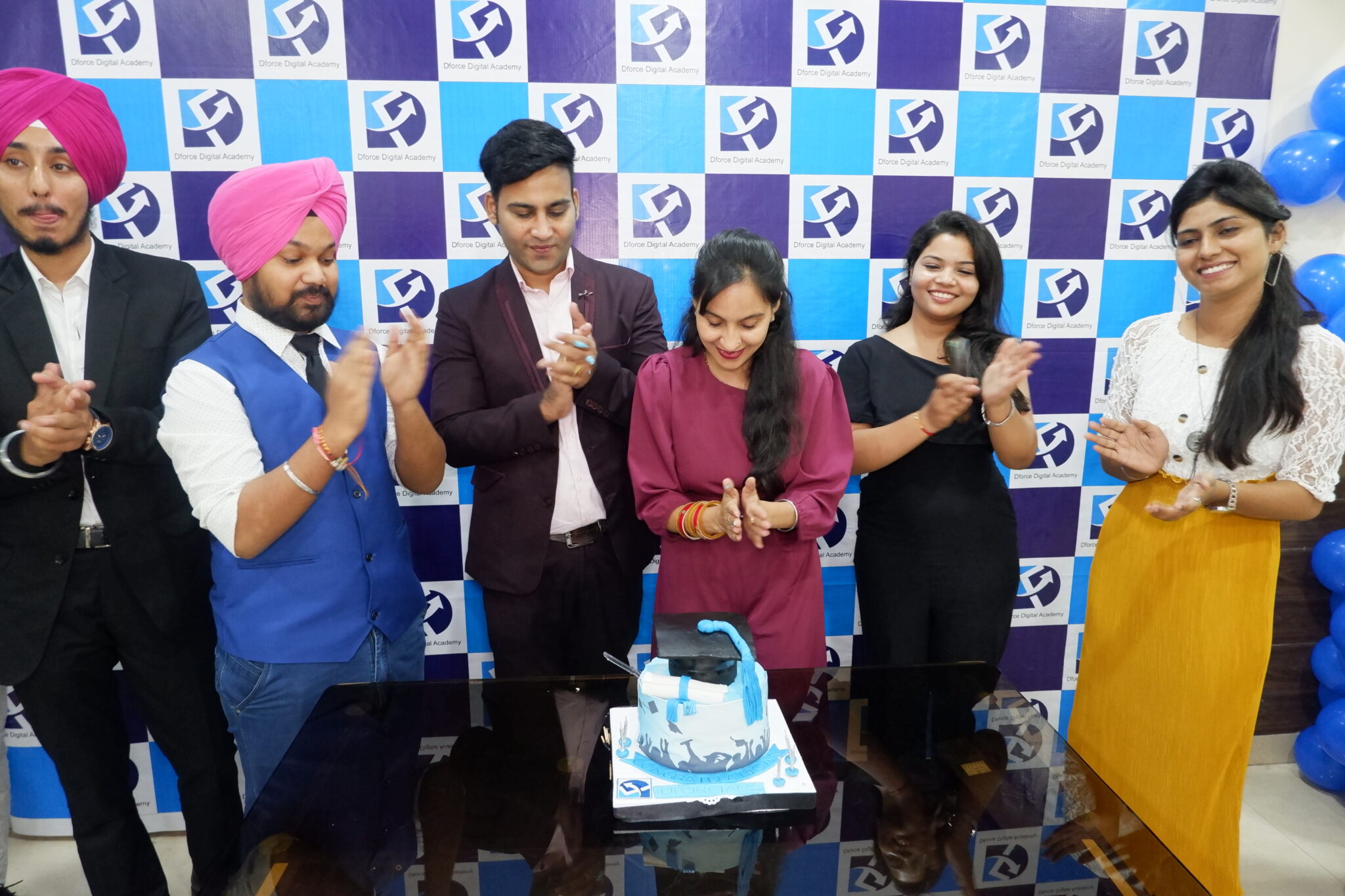


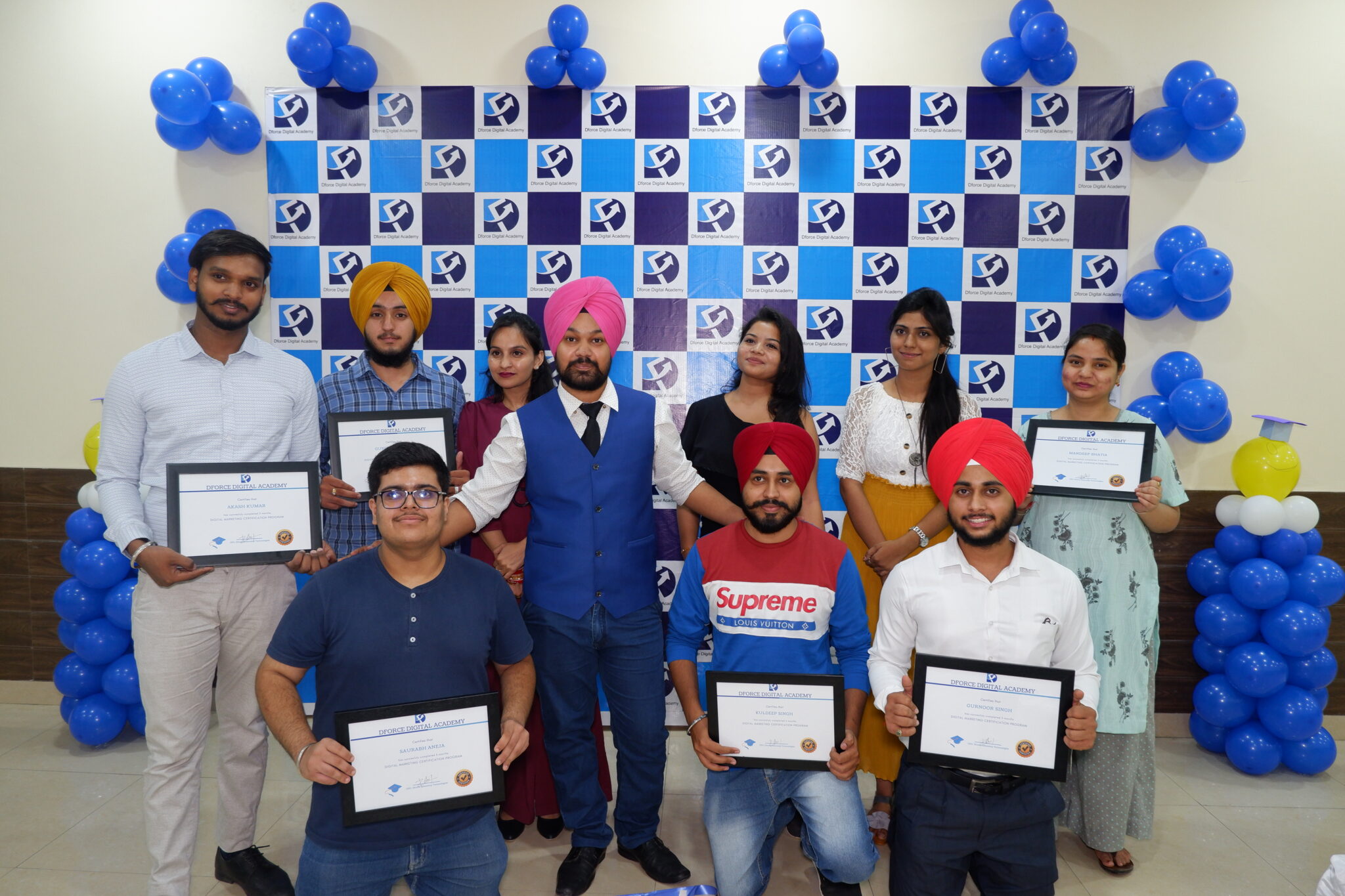
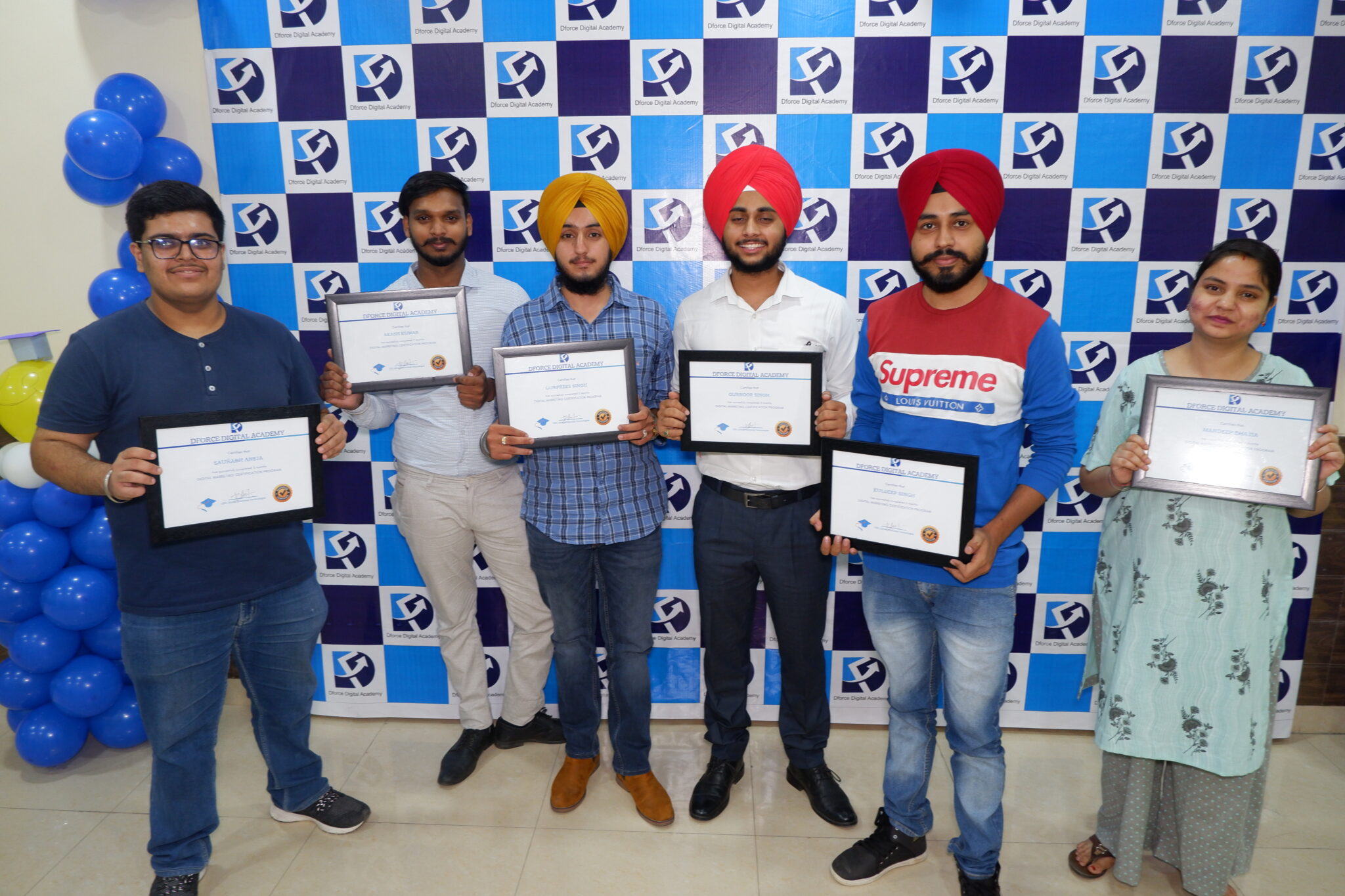
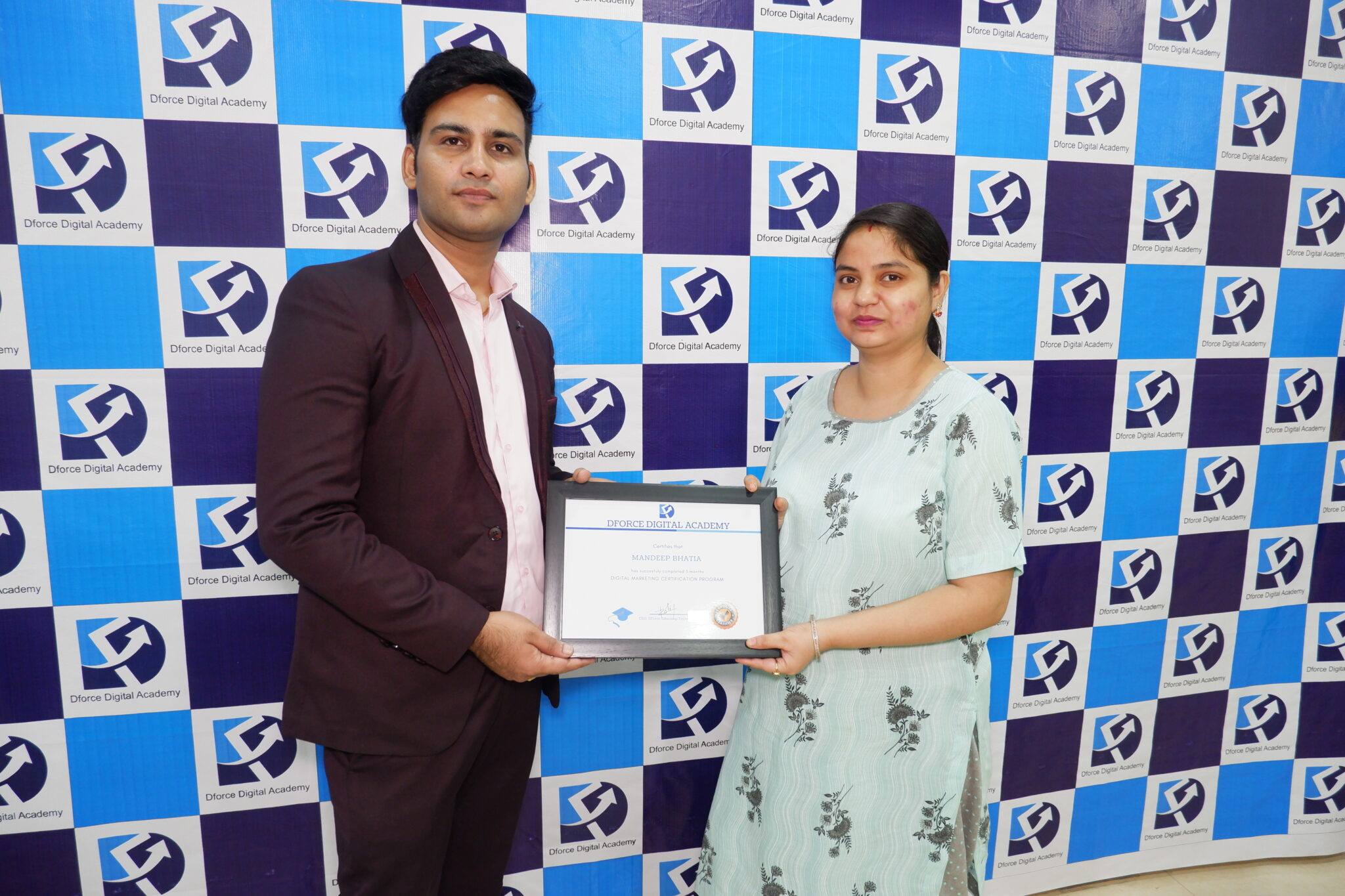
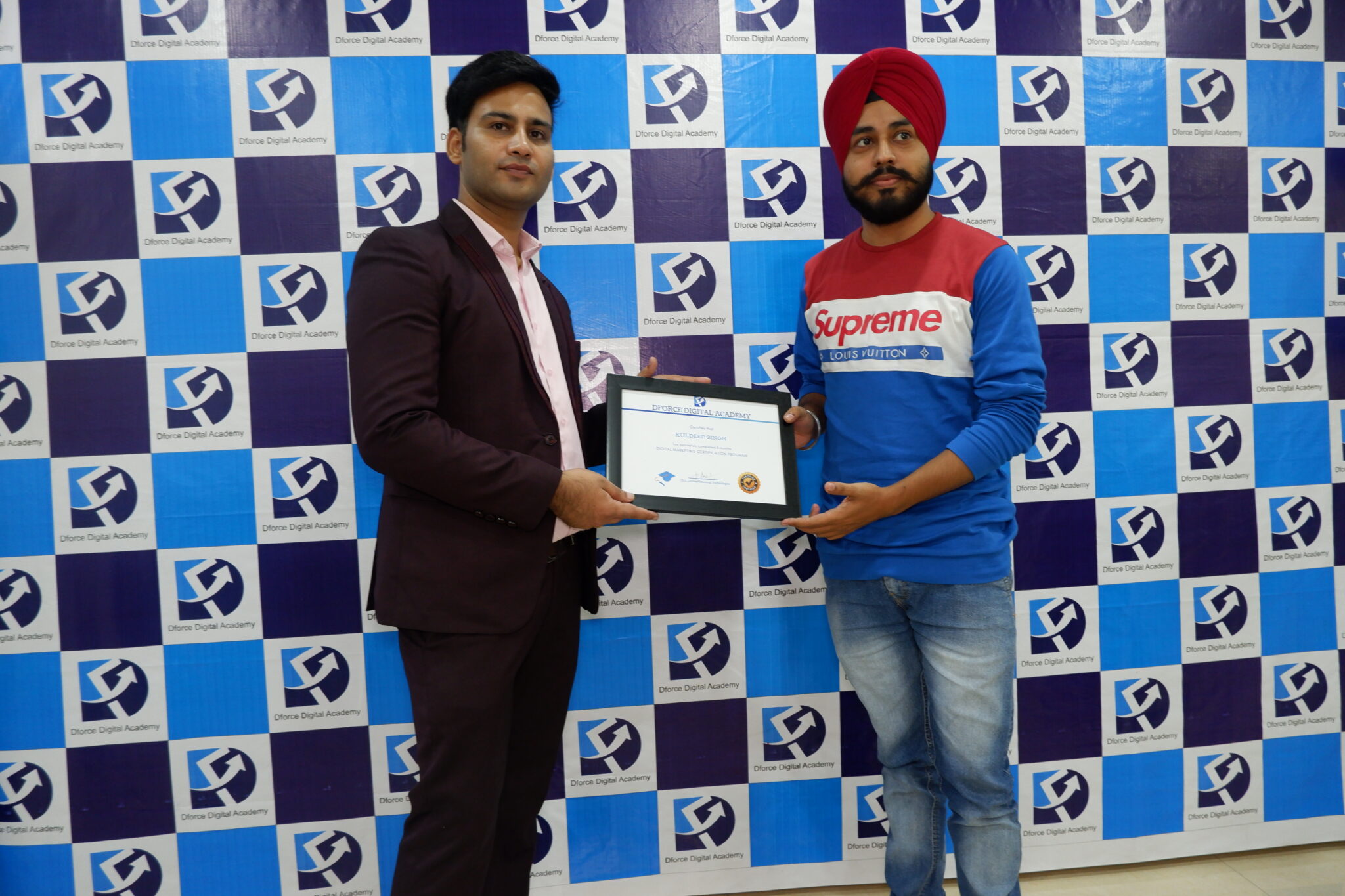
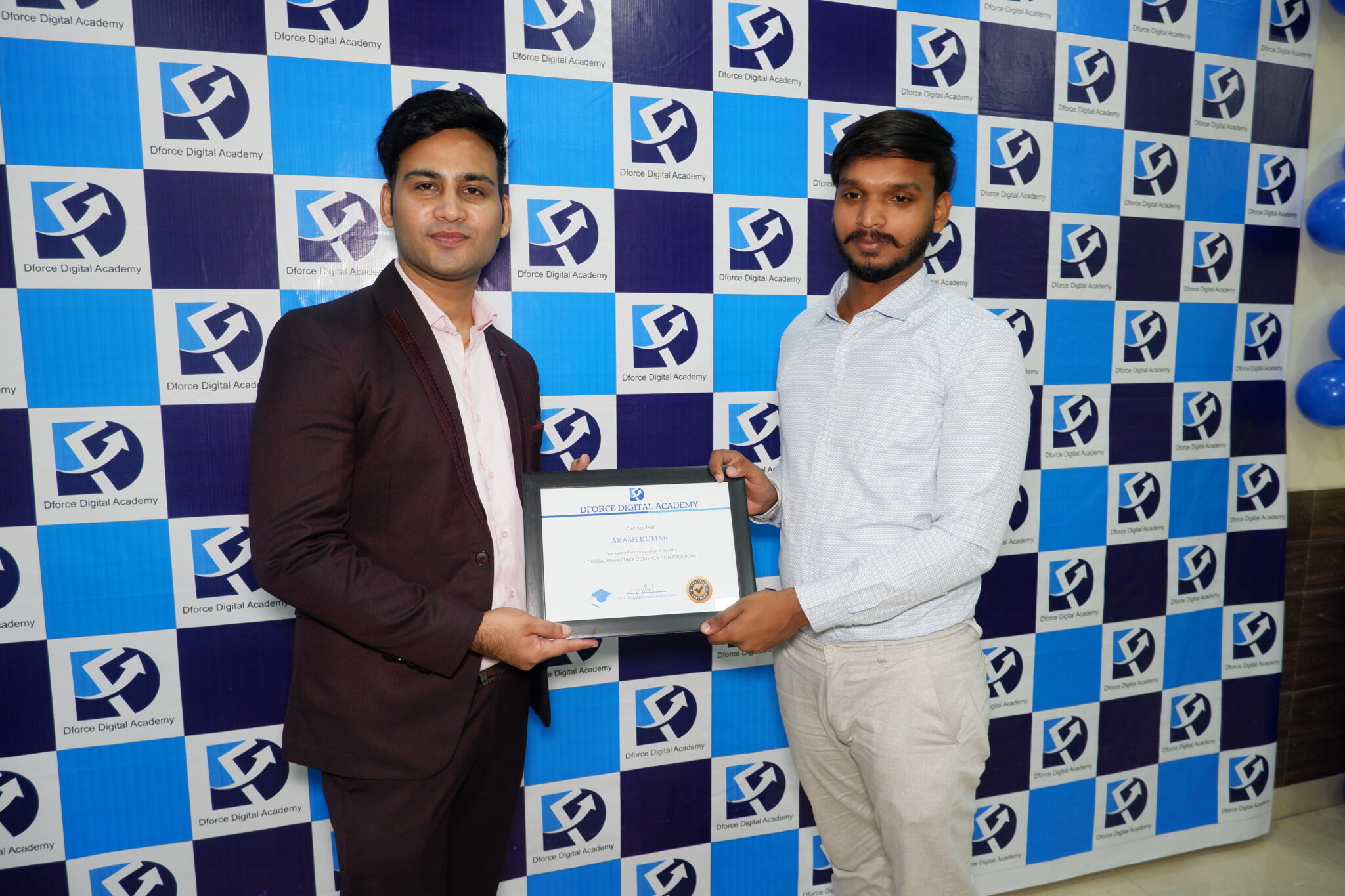
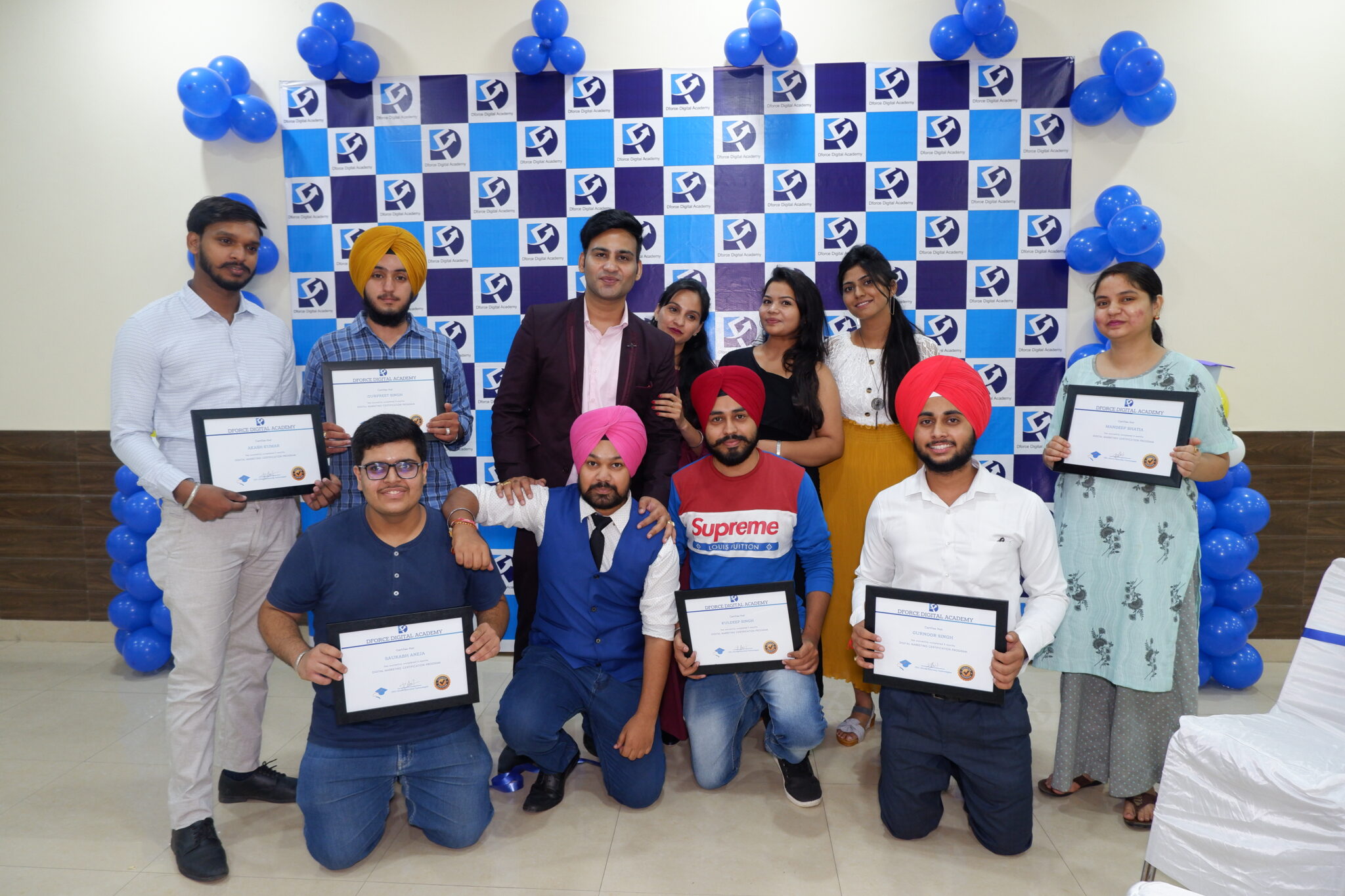
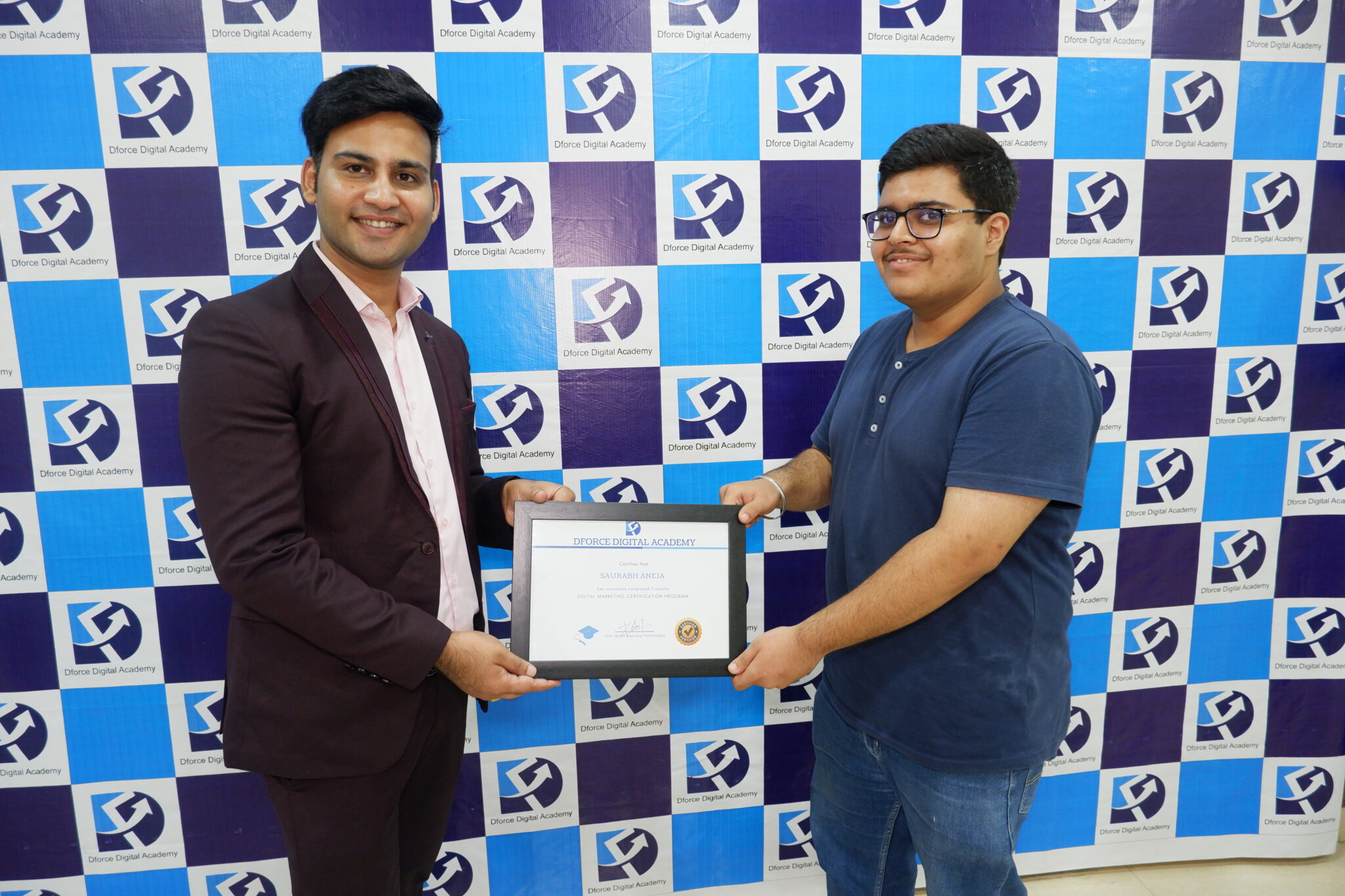
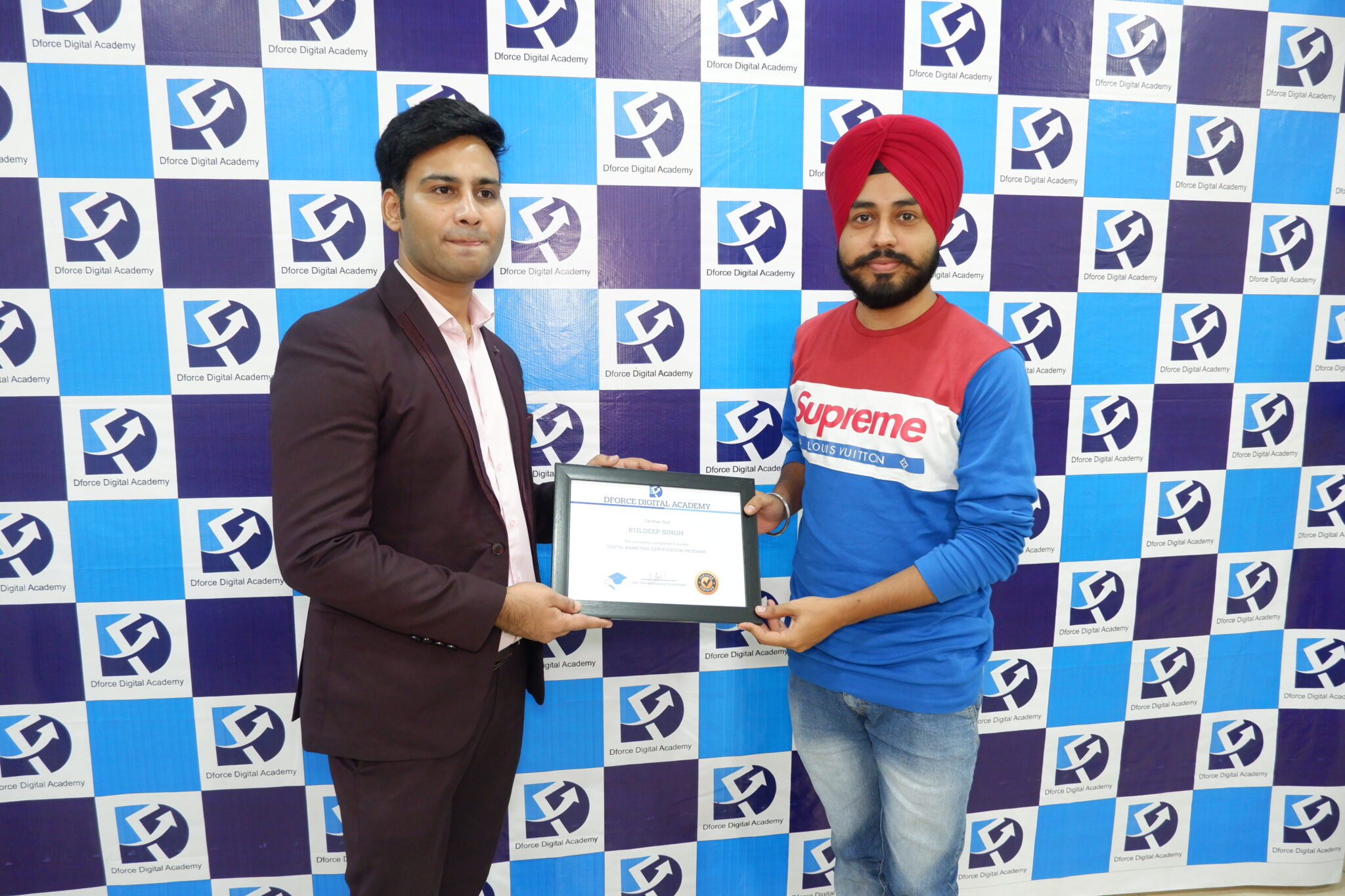
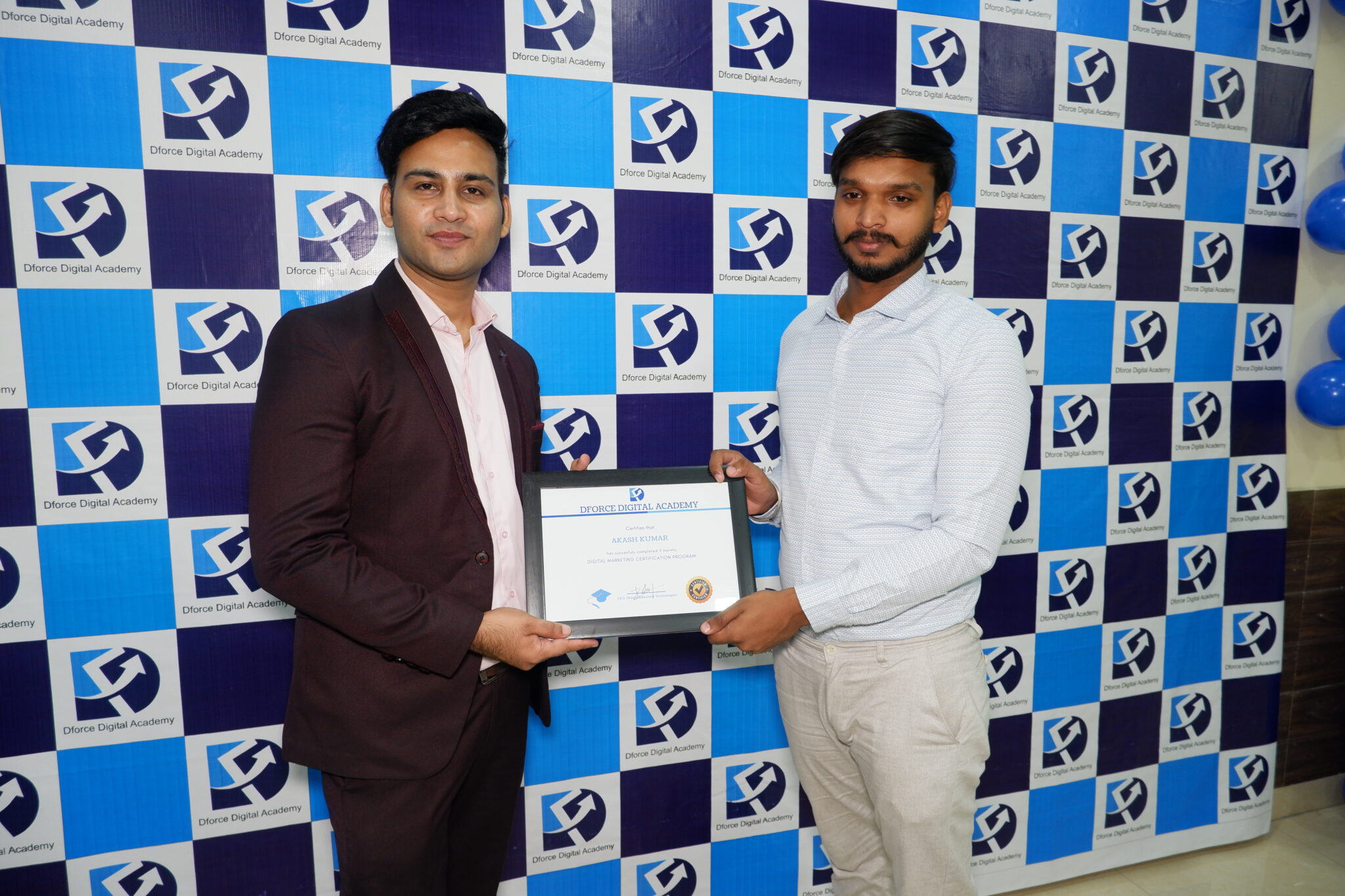
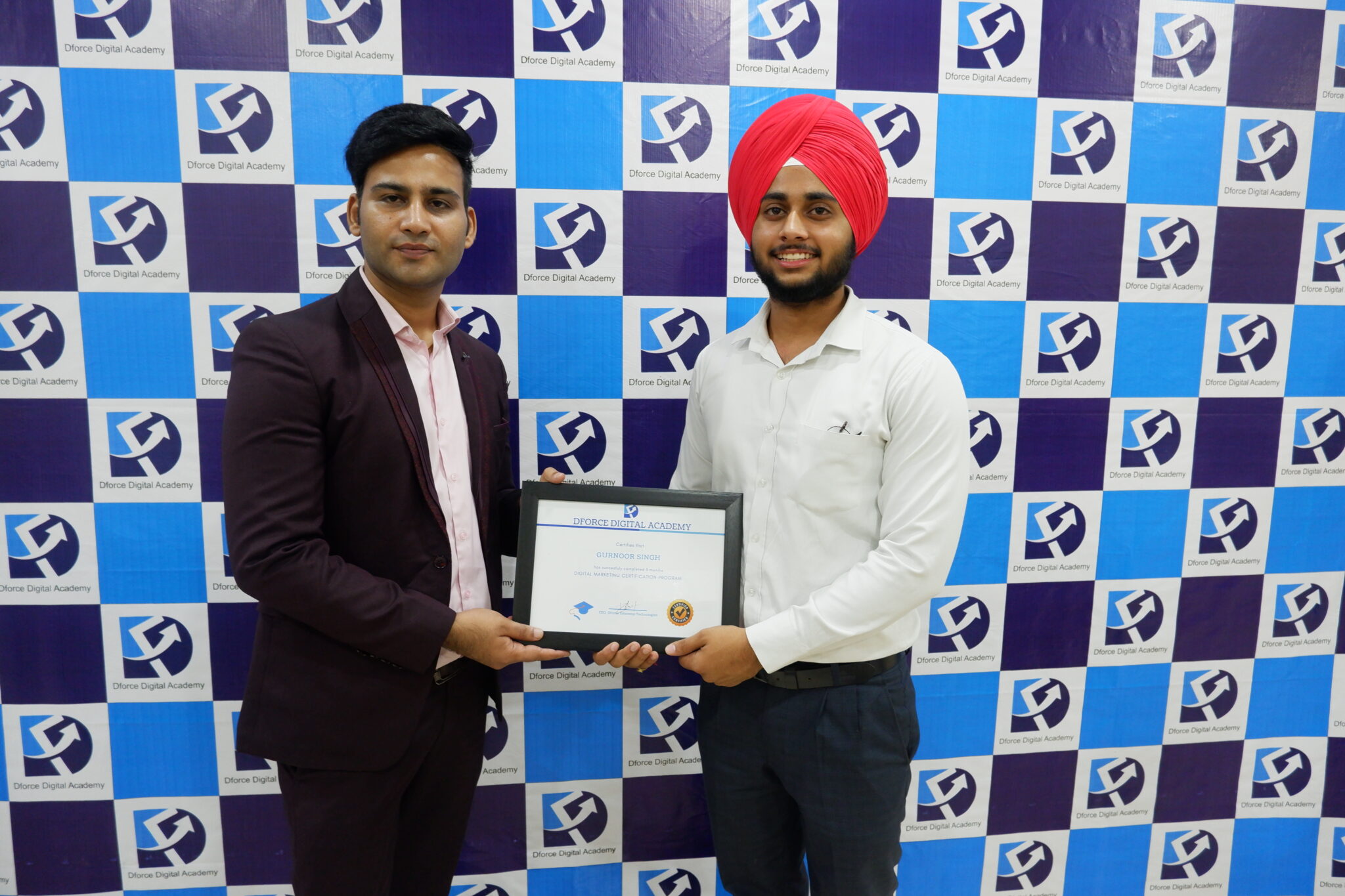
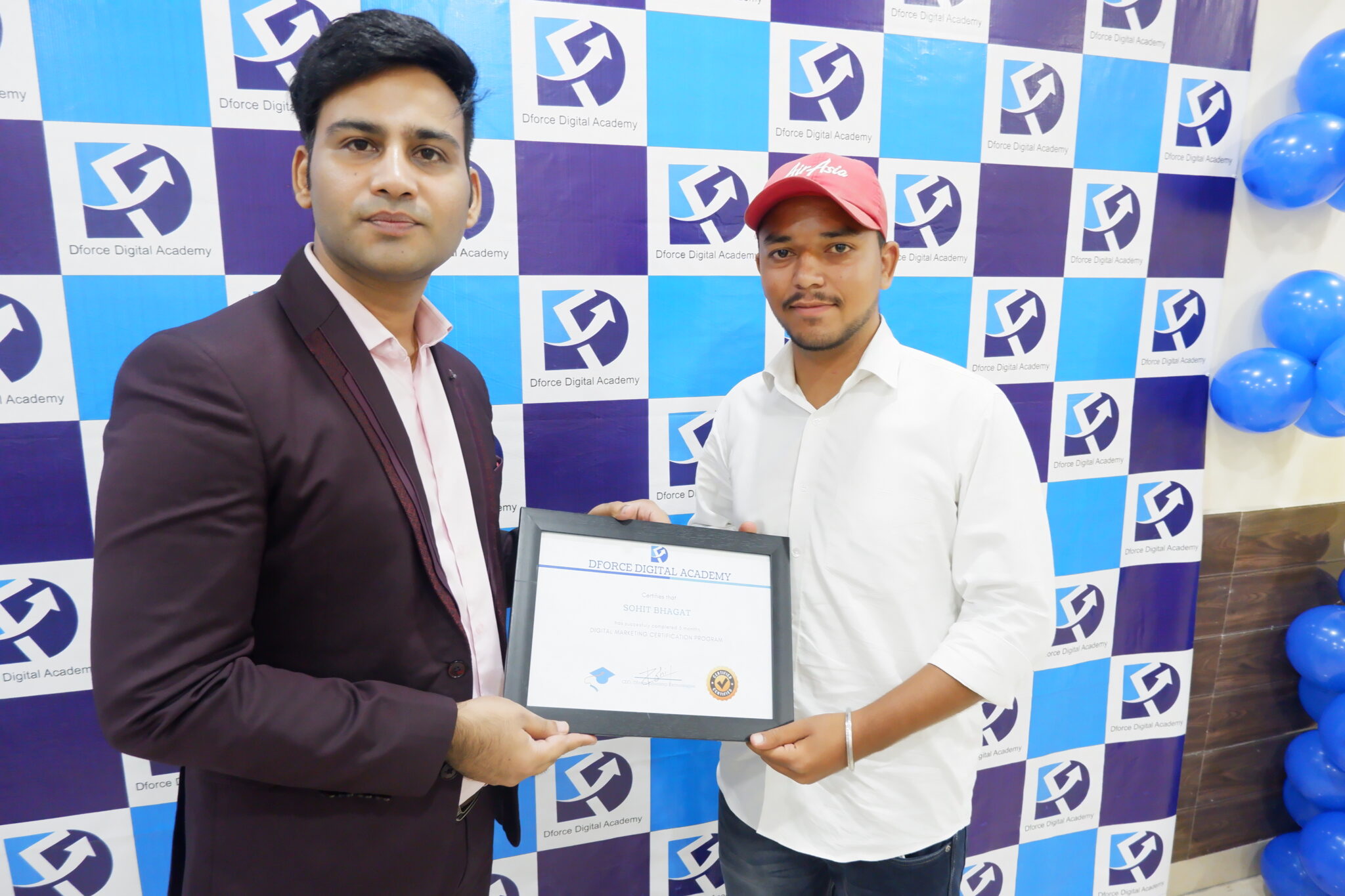
Why Dforce Academy?
Awarded Digital Marketing Institute in Punjab
Awarded as the "Best Digital Marketing Institute in Punjab" Year 2020 in the category of Pride of Indian Education Awards and became Punjab's First Award winning Digital marketing Institute.
100% Placement Record
All the Magic started happening from our very first batch, When all of our students got a job, We realised one thing that this Industry is booming and there are so many job Openings in the Market. Many of our students chosen to work as freelancers from the comfort of their home.
Punjab's Most Active Digital Marketing Institute
We took Initiative for Digital Marketing Awareness in Punjab with our Videos in Punjabi Language. We are the only Institute in Punjab to have an Active YouTube channel with many Informative Videos.
Interview Preparations
Before you leave us after the completion of your course, We Make sure that you are ready for the outside world to get a job and find Digital Marketing Clients. We schedule Mock Interviews to help you understand the questions asked in the interviews.
Experienced Trainers
Learn from the trainers already working in digital marketing. Learn from the experience of the industry leaders. With our experienced faculty, your chances of success are 4 times than normal trainers.
100% Practical Approach
We make sure that you learn everything practically which is covered in the syllabus. Work on projects in a team to train yourself for real-world challenges.
Become a Part of Every Celebration
We keep our students entertained so that they don't lose their interest and get bored. There is so much to learn while playing. Dforce celebrates Happiness and always keep in check your mental health.
Learn as a Team
During the whole year of the graduation. You will build teams with your classmates. Work, Plan, and Implement every digital marketing strategy you learn through the course and track your progress by yourself.
EMI Scheme Also Available
For those who cannot pay the fee, we have a special offer of an EMI scheme. You can select the number of months in installment from 6-9 months. 0% interest rate. **Offer valid for year 2020 only**
10+ Certifications
Boost the value of your resume with 10+ Certifications including Google & Facebook Certifications valid across the Globe.
A Great Career Opportunity Is Waiting for You

